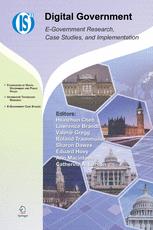

Most ebook files are in PDF format, so you can easily read them using various software such as Foxit Reader or directly on the Google Chrome browser.
Some ebook files are released by publishers in other formats such as .awz, .mobi, .epub, .fb2, etc. You may need to install specific software to read these formats on mobile/PC, such as Calibre.
Please read the tutorial at this link: https://ebookbell.com/faq
We offer FREE conversion to the popular formats you request; however, this may take some time. Therefore, right after payment, please email us, and we will try to provide the service as quickly as possible.
For some exceptional file formats or broken links (if any), please refrain from opening any disputes. Instead, email us first, and we will try to assist within a maximum of 6 hours.
EbookBell Team

4.3
88 reviewsNew information technologies are being applied swiftly to all levels of government service: local, county, regional and even national and international. Information technology (IT) is being used to improve data management and data sharing, planning and decision support, service delivery, and more. Application areas affected by government mandates to improve e-government service include healthcare and safety; law enforcement, security, and justice; education; land use; and many others. Information technology is being used to increase public access to information, to provide more convenient and timely transaction services, and to increase citizen participation in the establishment of government regulations and other processes. DIGITAL GOVERNMENT: E-Government Research, Case Studies, and Implementation provides the field with a definitive, interdisciplinary, and understandable review of recent IT and related research of particular importance to digital government. The book also includes explorations of current and future policy implications, and case studies of successful applications in a variety of government settings.
The book has been organized into three parts: Unit 1 covers the international foundations of digital government and related social, public, and legal issues (such as privacy, confidentiality, trust and security) that are evolving from governments’ new ways of doing business. Unit 2 examines current IT research that is impacting the advancement of digital government purposes and initiatives. In this section, a wide range of technologies are discussed with the objective of outlining a framework of state-of-the-art technologies showing the most promise for e-government initiatives. Unit 3 highlights case studies and applications of successful e-government initiatives from around the world which have wider lessons and implications. High impact projects are explored in detail, with a "lessons learned" discussion included with each case study. Each chapter is accompanied by references, suggested additional readings, online resources, and questions for discussion.